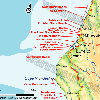dripdripFL

Joined: Mar 25, 2017
Posts: 55

|

Posted on Apr 08 2017 10:08 AM
bjoish wrote:
Yes, you got it right!
A voltmeter is a very good tool to get the polarity right.
Thanks for posting about this!
We have now improved the info on the FAQ to explain this more in detail.
http://www.surfyindustries.com/faq
Awesome, Bjorn! I figured it might help other members if I tried to explain it thoroughly as I understood it. As of yesterday, I was still scratching my head over polarity, but last night it all came together and I'm so glad I finally understand it. My Surfy Bear and Trem are in the mail, so I can't wait to get them built and finally join the club! Thanks Bjorn!
Last edited: Apr 08, 2017 10:10:44
|
dripdripFL

Joined: Mar 25, 2017
Posts: 55

|

Posted on Apr 08 2017 10:09 AM
Double post. Sorry.
Last edited: Apr 09, 2017 01:34:50
|
Redfeather

Joined: Jul 30, 2016
Posts: 883

|

Posted on Apr 08 2017 11:07 PM
What about using a built-in adapter housed inside the unit with just a permanent power cord coming out to avoid the possibility of the wrong type of DC being hooked to it? Has anyone done this or have any recommendations about how to do it?
I suppose one way would be to simply disassemble a 12V adapter and put a long power cord on it and shorten the existing lead on the other end..
|
Gilette

Joined: May 04, 2014
Posts: 734



|

Posted on Apr 09 2017 01:39 AM
Redfeather wrote:
What about using a built-in adapter housed inside the unit with just a permanent power cord coming out to avoid the possibility of the wrong type of DC being hooked to it? Has anyone done this or have any recommendations about how to do it?
I suppose one way would be to simply disassemble a 12V adapter and put a long power cord on it and shorten the existing lead on the other end..
For my SurfyBear/Trem I've used a 12 volt power module. It's about 15 dollar and gives a very clean voltage. It takes anything between 100 and 240 volts. Model RS-15-12 by MeanWell. You need two very short screws to attach it to the chassis and the plus and minus poles are connected to both surfy boards. Very easy and safe.


Last edited: Apr 09, 2017 01:49:47
|
wfoguy

Joined: Dec 11, 2011
Posts: 2130



|

Posted on Apr 09 2017 07:28 AM
^^^^^^^
I just ordered 1 of those. If I would have used the right terms when searching a year ago, I would have all ready got one.  Thank you. Thank you.
|
Pablomago

Joined: Mar 23, 2017
Posts: 85
Fort Collins, CO/Moonstone Beach, CA

|

Posted on Apr 09 2017 03:26 PM
I just realized that I have a dead solid state "Echo/Reverb" sitting in my garage that I could easily gut and use as a chassis/cabinet for a Trem/Reverb unit.
What do you guys like best? Reverb > Trem or Trem > Reverb? I guess I could make it switchable.
— All opinions expressed by this poster are well thought out and based on actual experience and/or scientific experimentation, except for those which are knee-jerk reactions or good sounding fantasies.
|
Gilette

Joined: May 04, 2014
Posts: 734



|

Posted on Apr 09 2017 03:46 PM
Pablomago wrote:
I just realized that I have a dead solid state "Echo/Reverb" sitting in my garage that I could easily gut and use as a chassis/cabinet for a Trem/Reverb unit.
What do you guys like best? Reverb > Trem or Trem > Reverb? I guess I could make it switchable.
Reverb > trem. It doesnt seem logical but it sounds better. Same as the Fender amps.
|
Redfeather

Joined: Jul 30, 2016
Posts: 883

|

Posted on Apr 09 2017 05:46 PM
Gilette, thanks for the tip! That is perfect. I see you have yours housed outside of all the electronics; do you feel that is necessary to avoid noise?
|
BrentD

Joined: Apr 07, 2009
Posts: 149
Michigan




|

Posted on Apr 09 2017 09:21 PM
OK, so I'm having a little difficulty. I'm getting lots of hum and no signal when the power is connected. This is the case regardless of polarity (it's the first thing I checked). If I do not have power connected, I get some signal directly through. The RCA jacks are not chassis-mounted yet, and grounding the sleeve of either one kills the signal completely (when there's no power). When power is on, there's just hum.
I tried reversing the RCA cables and at one point got a building, screeching feedback from what I think must have been springs getting hammered by DC.
I have attached a photo of my amateur wiring job. Are the pots wired backwards? Is that my problem?

— Neptune Trojans
Last edited: Apr 09, 2017 21:22:01
|
Gilette

Joined: May 04, 2014
Posts: 734



|

Posted on Apr 10 2017 12:09 AM
Redfeather wrote:
Gilette, thanks for the tip! That is perfect. I see you have yours housed outside of all the electronics; do you feel that is necessary to avoid noise?
No, these power supplies are well shielded. The alu box I bought just wasn't big enough. 
|
Gilette

Joined: May 04, 2014
Posts: 734



|

Posted on Apr 10 2017 12:14 AM
BrentD wrote:
OK, so I'm having a little difficulty. I'm getting lots of hum and no signal when the power is connected. This is the case regardless of polarity (it's the first thing I checked). If I do not have power connected, I get some signal directly through. The RCA jacks are not chassis-mounted yet, and grounding the sleeve of either one kills the signal completely (when there's no power). When power is on, there's just hum.
I tried reversing the RCA cables and at one point got a building, screeching feedback from what I think must have been springs getting hammered by DC.
I have attached a photo of my amateur wiring job. Are the pots wired backwards? Is that my problem?
From what I can see there is a possibility you have switched the hot wire with the ground wire on at least one of the jacks. That way all noise signals from the shielding get into the circuit, instead of your virtuoso guitar playing. Check all ground wires.

|
BrentD

Joined: Apr 07, 2009
Posts: 149
Michigan




|

Posted on Apr 10 2017 07:01 AM
Thanks! I think three days of cabinet building fuzzed my brain out or something. I'm halfway through a bowl of cereal but I'll switch those wires back as soon as I'm done.
— Neptune Trojans
|
dripdripFL

Joined: Mar 25, 2017
Posts: 55

|

Posted on Apr 10 2017 07:03 AM
BrentD wrote:
Thanks! I think three days of cabinet building fuzzed my brain out or something. I'm halfway through a bowl of cereal but I'll switch those wires back as soon as I'm done.
I take it your cabinet is for the Surfy Bear? When you get it buttoned up, let's see some pics!
|
BrentD

Joined: Apr 07, 2009
Posts: 149
Michigan




|

Posted on Apr 10 2017 01:56 PM
Gilette, thanks. It wasn't just one jack, it was both. I think in my excitement I mixed up tip and sleeve, and then did it again when I was aiming for consistency (ha!). It's all better now, save for a light hum that I think final shielding and shielded reverb cables will fix.
dripdripFL, will do! It's currently unfinished. I am debating on the color and texture, though the front design is finalized. I'll probably hold off until I've got that done.
— Neptune Trojans
|
Gilette

Joined: May 04, 2014
Posts: 734



|

Posted on Apr 10 2017 02:28 PM
|
wfoguy

Joined: Dec 11, 2011
Posts: 2130



|

Posted on Apr 12 2017 12:11 PM
In case anybody wondered how large the Mean supply is:

|
BrentD

Joined: Apr 07, 2009
Posts: 149
Michigan




|

Posted on Apr 12 2017 01:36 PM
That's cool! I have been doing OK with the Yamaha PA-130. It's the right polarity and also has an 8'+ cable.
— Neptune Trojans
|
dripdripFL

Joined: Mar 25, 2017
Posts: 55

|

Posted on Apr 13 2017 02:11 PM
My SB is in the mail, but I have a question about power supplies, since I'm getting ready to purchase one.
The SB takes a 12VDC 1A power supply and the website recommends "regulated, low ripple". Does buying a regulated power supply mean that it's also low ripple, or do I need to find one that states both of those terms in the specs?
|
BrentD

Joined: Apr 07, 2009
Posts: 149
Michigan




|

Posted on Apr 13 2017 03:35 PM
I don't have a full chassis around mine, and I think that's contributing to some hum. To test my theory I was thinking of picking up one of the inexpensive sheet metal toolboxes I see used around here. For those of you with these toolboxes, do they effectively shield your PCB?
— Neptune Trojans
Last edited: Apr 13, 2017 15:35:26
|
bjoish

Joined: Jul 06, 2010
Posts: 596
Stockholm



|

Posted on Apr 13 2017 04:20 PM
dripdripFL wrote:
My SB is in the mail, but I have a question about power supplies, since I'm getting ready to purchase one.
The SB takes a 12VDC 1A power supply and the website recommends "regulated, low ripple". Does buying a regulated power supply mean that it's also low ripple, or do I need to find one that states both of those terms in the specs?
Its actually quite easy.
Most modern power adapters are small switch mode devices and these normally works great.
Old power supplies were using big transformers and often bad regulators. If you have difficulties to find one, we have power adapters available on the website.
|


































